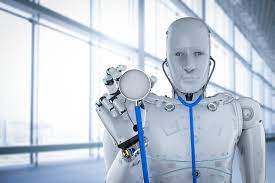The word “hakim” is highly used in Syrian everyday dialect to designate a physician, which means “a wise man”, aren’t we in urgent need of wise men those days?!! However could it be possible to substitute those greatly in need doctors and wise men by Artificial Intelligence?
(AI) is a software system that attempts to simulate human intellect by using data sources to make independent decisions or assist humans in making decisions. It is a general term that includes machine learning, representation learning, deep learning, and natural language processing. Artificial intelligence is a field of computer science that can analyze large amounts of data. However, it is not only related to computer science but extends into many areas such as medicine, philosophy, psychology, linguistics, and statistics. In medicine, it has contributed to treating several illnesses and decreased many mistakes in diagnosis and follow-up. It has increased recently, expanding from research to application in various sectors.
However, Middle East countries are still deficient in multiple AI implementation methods in the field of medicine. So, holding these AI implementation methods in the medical field is necessary, which may be incredibly beneficial for making diagnosis more accessible and help in the treatment.
At the end of 2022, the Vellore Institute of Technology, India has published a study conducted by a group of Syrian doctors. Their research intended to determine AI’s knowledge, attitude, and practice among doctors and medical students in Syria.
 A questionnaire conducted an online cross-sectional study on the Google form website consisting of demographic data, knowledge, and perception of AI. There were 1,494 responses from both doctors and medical students.
A questionnaire conducted an online cross-sectional study on the Google form website consisting of demographic data, knowledge, and perception of AI. There were 1,494 responses from both doctors and medical students.
The study included Syrian medical students and doctors who are currently residing in Syria. Of the 1,494 participants, 255 (16.9%) are doctors, while the other 1,252 (83.1%) are undergraduate medical students. About 1,055 (70%) participants have previous knowledge about AI.
However, only 357 (23.7%) participants know about its application in the medical field. Most have shown positive attitudes toward its necessity in the medical field; 689 (45.7%) individuals strongly agree, and 628 (41.7%) agree. The undergraduate students had 3.327 times more adequate knowledge of AI than students in the first year.
In contrast, the undergraduate 6th-year students had 2.868 times the attitude toward AI higher than students in the first year. The residents and assistant professors had 2.371 and 4.422 times the practice of AI higher than students, respectively.
Although most physicians and medical students do not sufficiently understand AI and its significance in the medical field, they have favorable views regarding using AI in the medical field.
The study suggested that Syrian medical authorities and international organizations should including artificial intelligence in the medical field, particularly when training residents and fellowship physicians.
To conclude, the future of AI in healthcare is bright and hopeful. AI may help lessen some of the drawbacks of traditional methods of diagnosis and treatment, including the risk of errors because of burnout in the medical field and other psychological impacts, the need to examine many patients quickly, the occasional inaccuracy of the diagnosis, and patients’ anxiety when confronted by a clinical doctor.
However, there are also unbelievable preconceptions of what AI is capable of and how the future of the healthcare sector will pan out, such as the assumption that AI will eventually replace doctors and that programming skills are required to use AI effectively.
However, Syrians still believe that passionate love is capable of curing them, doctors included. According to a folkloric song:
He said “Oh Doctor! My body’s movements have slowed down. Do you have a drug to prolong my life and strengthen my heart?”
Doctor replied: “Do you love?” “No”
“Do you stay up all night?” “No”
Doctor: “Life is empty and meaningless for those who do not experience deep love and stay vigil all night”
That is the funny kind of AI used in medical culture of Syrian patients and doctors.
Report: Lama Alhassanieh

